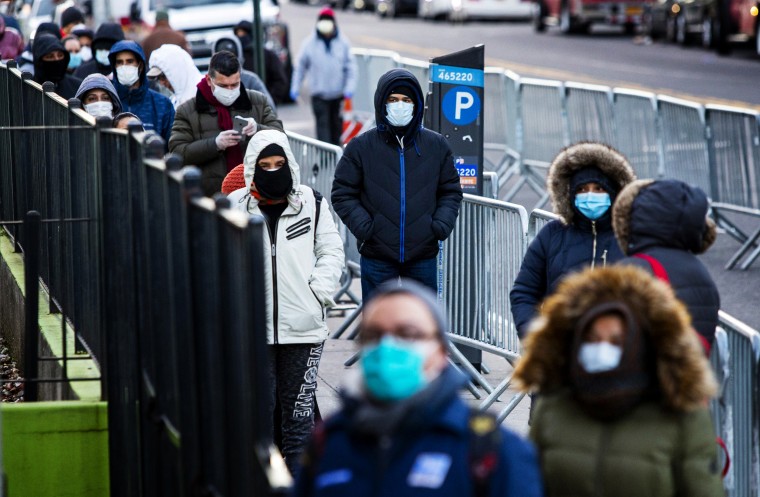In just three months, more than 1 million cases of COVID-19 have been reported around the world, including close to a quarter-million in the U.S. alone. The virus has killed more than 50,000 people and defied many countries' efforts to stop its spread.
The grim statistics raise a question: Just how contagious is the coronavirus?
Full coverage of the coronavirus outbreak
It's a question scientists are trying to answer in real time as more data on the illness roll in.
A study published Wednesday in the journal Nature found that people with minor complaints — slight cough, headache, low-grade fever — are most contagious at the earliest stages of their illness, either right before their symptoms begin or within the first few days.
That's concerning, because physicians have noted that the illness tends to ramp up slowly in many patients, who don't necessarily know they're sick until about a week later.
A critical care physician in New Orleans told NBC News that the process is like a "slow burn."
Dr. Anthony Fauci, director of the National Institute of Allergy and Infectious Diseases, called the findings in the Nature study "disturbing" in an interview with "TODAY" on Thursday.
"That person could be out there feeling well and inadvertently and innocently spreading the infection," Fauci said.
Contagiousness is measured by how much of the virus a person releases into his or her surroundings, a process called "viral shedding."
Respiratory droplets — packed with virus particles spewed when a person coughs or sneezes — remain the "leading mode of transmission," said Dr. Peter Hotez, co-director of the Center for Vaccine Development at Texas Children's Hospital and dean of the National School of Tropical Medicine at the Baylor College of Medicine in Houston.
"We know that people who are symptomatic are likely spreading this virus through coughing and sneezing," Hotez said. "Small micro-droplets travel within a few feet and land on the ground or they go directly onto people's faces."
Download the NBC News app for full coverage of the coronavirus outbreak
On Thursday, the Centers for Disease Control and Prevention added "talking" to the list of ways respiratory droplets can spread from person to person, which may explain in part how transmission takes place among people without symptoms like coughing and sneezing.
The phenomenon, known as asymptomatic transmission, could account for up to a quarter of transmissions.
How can I protect myself?
Despite the unknowns, there are some tried and true basics to infectious disease control that can help: social distancing, meaning staying at least 6 feet away from others, and proper hand-washing.
Experts advise scrubbing your hands with soap and water for at least 20 seconds or using hand sanitizer if soap isn't available.
While wearing a fabric mask won't necessarily reduce your own risk of getting sick, it can help prevent the spread of the virus to others around you.
Doctors also advise taking this time to care for your overall health. That includes taking medications as prescribed; keeping in touch, even remotely, with family doctors; and maintaining a healthy lifestyle.
"If you're not sleeping well, if you're not eating well, if you're drinking too much alcohol or smoking or vaping, you're not doing yourself any favors during this time of biologic vulnerability," said Dr. Alexa Mieses, a family physician in Durham, North Carolina.


